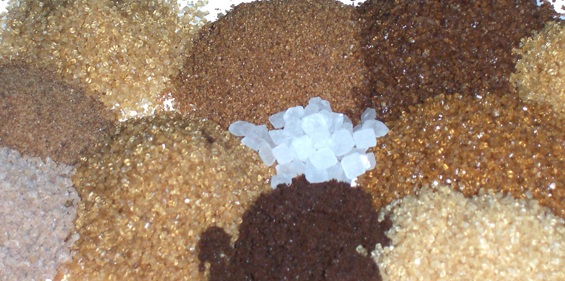Grahi’s useful research on these subjects, in particular on sugar addiction…

What makes you fat?
Why is being overweight so easy?
Are you addicted to sugar? (20 second test)
Consequences of sugar addiction
Healing sugar addiction
References
What makes you fat?
Sugar. It’s very simple. Sugar makes you fat. Your liver converts the sugar in everything you eat and drink into fat. The more sugar you consume, the fatter you get. When you stop consuming sugar, you lose the fat.
Sugar causes overweight / weight gain / obesity. Fructose is the worst kind of sugar. (16,18) Sugar upsets several hormones (11,12,13) including those that make you feel full when you’ve had enough to eat. (9)
Unfortunately, it is not quite so easy to stop eating sugar. Sugar is highly addictive (1,2,3,4,5,14,15). Did you know that sugar is as addictive as cocaine, heroin or morphine? (8,10)
When you eat a more normal diet that doesn’t contain sugar, you won’t be deprived. You won’t feel like you’re dieting, because you are not. (6) You’ll just be eating the way that humans are meant to eat. And you’ll have the body shape and size that humans are meant to have.
Why is being overweight so easy?
1. Sugar is addictive (1,2,3,4,5,6,14,15). Once you’re hooked, it is the same as being addicted to alcohol, nicotine, caffeine, heroin, morphine or any other addictive substance. Well-meaning parents and family unknowingly feed sugar to small children. Nowadays we start them right at the beginning with apple juice and other sweet baby foods. Processed food manufacturers deliberately add sugar to their foods and drinks to keep you hungry and keep you coming back for more. Most overweight people have been addicted to sugar all their lives. The processed food industry thrives on sugar.
You don’t really believe that sugar is so addictive? It is not easy to completely stop consuming sugar – maybe harder than giving up smoking. Breaking sugar’s addictive grip on you needs real determination. It’s not just giving up something you enjoy; rather it is stopping something that is compulsive.
2. Sugar is cheap and added to everything. 100 years ago, sugar was rare and very expensive. There were almost no obese people, and even fat people were unusual. Most people were like string beans by today’s standards. Heart disease was a medical rarity. Before World War II, obesity was uncommon in the USA, Australia and England. Most food was prepared at home or in a traditional manner. Sugar was available, but expensive. Sweets, colas, chocolates, pastries, biscuits/cookies and so on were a rare treat for most people. Very few people were addicted to sugar.
Today however, sugar is cheap. It is available everywhere for just a dollar or two per kilo. High fructose corn syrup (HFCS), the addictive sweetener that is now added to most processed foods and drinks, is virtually a waste product and used by the ton.
If you buy food in supermarkets, you are being trained to have a sweet tooth for every food and drink you consume – breakfast, lunch, dinner and everything in between. You are being captured and deliberately addicted to sweet foods and drinks. (14,15,19) If you are a food manufacturer, the way to beat your competition is to add more sugar to your products than they do.
The weight-loss industry, the various food industries, and the supermarket and drink industries don’t want you to know it’s so simple. If everybody knew what to do to keep slim, these industries would lose most of their profits and go out of business. So they have a strong incentive to keep you confused with false information (example: eating fat makes you fat, so buy low-fat foods. (7))
Are you addicted to sugar? (20 second test)
-
- Do you ever need sugar as a pick-me-up? Perhaps a sweet snack/chocolate/cookie with your mid-morning coffee? A dessert after a meal? A sweet protein or dried fruit bar after your exercise?
- Do you struggle to walk past a sweet treat without taking just one?
- Are your favourite foods sweet rather than savoury?
- If you have a whole day without sugar, do you suffer mood swings, headaches or low energy?
If you answered yes to just one of the above questions, you are addicted to sugar.
Your use of sugar is not because you are weak-willed, a glutton, or have a personality defect. It is because you are addicted to a substance called fructose that is hidden in the food supply and has been fed to you for years. An addiction is an uncontrollable, compulsive behaviour, despite the health and social consequences.
Consequences of sugar addiction
- Obesity or being overweight (19)
- Metabolic syndrome or type II diabetes (13,16,18)
- Heart and arterial disease, high blood pressure (17). Fructose immediately raises blood platelet stickiness and clotting.
- Tooth decay
- Stroke
- Depressed immune system. A hit of fructose and some other sugars causes a spike in your cortisol level. The effect is immediate, and lasts for about five hours
- Stress. The elevated cortisol described above makes you more prone to stress
- Hot flushes and other symptoms of a difficult menopause
- Polycystic ovary syndrome
- Erectile dysfunction
- Infertility
- Gout
- Kidney disease
- Dementia and Alzheimer’s disease, depression, anxiety
- Cancers
- Fatty liver disease, cirrhosis, liver failure
- Rapid aging
- Poor quality skin
- Mineral depletion, causing a range of other seemingly unrelated health problems
There are several different types of sugar (sucrose, glucose, galactose, fructose and others). Fructose is the one that is responsible for most obesity and digestive problems today. When you have eaten enough of most foods, your gut or pancreas releases a hormone to make you feel full (satiated). Fructose bypasses the “feel full” mechanism. Instead, your liver rapidly turns it into fat. This shows up as a high level of blood triglyceride, which leads to heart disease.
Healing sugar addiction
How to heal sugar addiction. It takes weeks for most people. It requires determination and help based on the experience of others.
References
1. Nicole M. Avena, Pedro Rada, Bartley G. Hoebel. Evidence for sugar addiction: Behavioural and neurochemical effects of intermittent, excessive sugar intake. Neuroscience and Biobehavioral Reviews 32 (2008) 20-39. Article
2. Nicole M. Avena, Pedro Rada, Bartley G. Hoebel. Sugar and Fat Bingeing Have Notable Differences in Addictive-like Behavior. The Journal of Nutrition, 2009. Article
3. Corsica, Joyce A.; Pelchat, Marcia L. Food addiction: true or false? Gastroenterology: March 2010 – Volume 26 – Issue 2 – p 165-169.
4. Blumenthal, Daniel M.; Gold, Mark S. Neurobiology of food addiction. Clinical Nutrition & Metabolic Care: July 2010 – Volume 13 – Issue 4 – p 359-365. Article
5. Leandro F. Vendruscolo, Aliou B. Gueye, Muriel Darnaudery, Serge H. Ahmed, Martine Cador. Sugar Overconsumption during Adolescence Selectively Alters Motivation and Reward Function in Adult Rats. Open Access, February 2010. Article
6. Marcia Levin Pelchat. Food Addiction in Humans. Supplement to The Journal of Nutrition, April 2008. Article
7. We need healthy fats in our diets, and they are NOT the cause of obesity. Low-fat foods and drinks have an immediate appeal to people who are overweight, and are easy to advertise to them. Low-fat diets were based on faulty research by Ansel Keys and others after World War II, are now discredited. Low-fat diets do not help prevent heart disease either. However, low-fat foods suit the processed dairy food industry, and other food industries. A full discussion is in my book Grow Youthful.
8. Alburges M.E., Narang N., Wamsley J.K. Alterations in the dopaminergic receptor system after chronic administration of cocaine. Synapse. 1993;14:314-323.
9. Avena N.M., Rada P., Moise N., Hoebel B.G. Sucrose sham feeding on a binge schedule releases accumbens dopamine repeatedly and eliminates the acetylcholine satiety response. Neuroscience. 2006;139:813-820.
10. Bakshi V.P., Kelley A.E. Sensitization and conditioning of feeding following multiple morphine microinjections into the nucleus accumbens. Brain Res. 1994;648:342-346.
11. Bray G.A., Nielsen S.J., Popkin B.M. Consumption of high-fructose corn syrup in beverages may play a role in the epidemic of obesity. Am J Clin Nutr. 2004;79:537-543.
12. Corwin R.L. Bingeing rats: a model of intermittent excessive behavior? Appetite. 2006;46:11-15.
13. Curry D.L. Effects of mannose and fructose on the synthesis and secretion of insulin. Pancreas. 1989;4:2-9.
14. Davis C., Claridge G. The eating disorders as addiction: a psychobiological perspective. Addict Behav. 1998;23:463-475.
15. Drewnowski A., Krahn D.D., Demitrack M.A., Nairn K., Gosnell B.A. Taste responses and preferences for sweet high-fat foods: evidence for opioid involvement. Physiol Behav. 1992;51:371-379.
16. Elliott S.S., Keim N.L., Stern J.S., Teff K., Havel P.J. Fructose, weight gain, and the insulin resistance syndrome. Am J Clin Nutr. 2002;76:911-922.
17. Howard B.V., Wylie-Rosett J. Sugar and cardiovascular disease: A statement for healthcare professionals from the Committee on Nutrition of the Council on Nutrition, Physical Activity, and Metabolism of the American Heart Association. Circulation. 2002;106:523-527.
18. Le K.A., Tappy L. Metabolic effects of fructose. Curr Opin Clin Nutr Metab Care. 2006;9:469-475.
19. Ludwig D.S., Peterson K.E., Gortmaker S.L. Relation between consumption of sugar-sweetened drinks and childhood obesity: a prospective, observational analysis. Lancet. 2001;357:505-508.
 Jivan Grahi (David Niven Miller) was born and raised in Zimbabwe and lives nowadays in Perth, Western Australia; he is an avid swimmer who loves the wild shore of the Indian Ocean nearby. By profession an economist and author of several successful self-help books about computers, he embarked twelve years ago on a quest on how to slow down the aging process.
Jivan Grahi (David Niven Miller) was born and raised in Zimbabwe and lives nowadays in Perth, Western Australia; he is an avid swimmer who loves the wild shore of the Indian Ocean nearby. By profession an economist and author of several successful self-help books about computers, he embarked twelve years ago on a quest on how to slow down the aging process.
www.growyouthful.com
Grahi is the author of Grow Youthful
Read Bhagawati’s article on Grahi’s work: Youthful and Healthy At Any Age




Comments are closed.